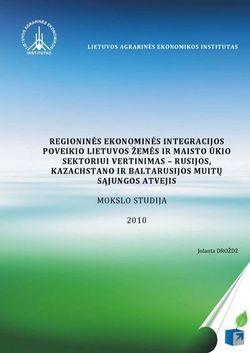
Over the past twenty years the tendency of establishing cross-border trading and economic associations might be identified. The establishment of customs union between Russia, Belarus and Kazakhstan (the RBK Customs Union) in 2010 is one of the most relevant regional economic alliances for Lithuania. The union of these countries will have a significant impact on the Lithuanian agricultural and food export, as Russia is one of the most important export markets for Lithuanian products. The aim of this study is to identify theoretical assumptions of regional economic integration, to assess the impact of RBK Customs union and to provide reasonable recommendations for Lithuanian agricultural and food exporters.
The six objectives are as follows:
- To identify the theoretical assumptions of regional economic integration.
- To evaluate the potentials of agricultural sector for the RBK Customs Union members.
- To estimate the revealed comparative advantage of agricultural and food sector for the RBK Customs Union members.
- To analyze new foreign trade conditions among the RBK Customs Union members.
- To estimate the possible impact of the RBK Customs Union establishment on Lithuanian agricultural and food exporters.
- To provide recommendations respecting changing foreign trade conditions.
The review of scientific literature implied the main assumptions of regional economic integration. In this case the monographic approach was implemented. The methods of deduction, comparative analysis, historical comparison and statistical analysis were applied in order to assess the RBK Customs Union members' economic situation, potential of agricultural sector and possible impact on Lithuanian agricultural and food export. Thus, using the RCA index (Revealed comparative advantage called) the international competitiveness of the RBK Customs Union member states in agricultural and food sectors was measured. In fact, the competitiveness of the RBK Customs Union members' agricultural products in global market and RCA changes under different unions were also analyzed.
As the result, both the theoretical assumptions on the formation of regional economic integration were highlighted and the recommendations for Lithuanian agricultural and food exporters were presented.
